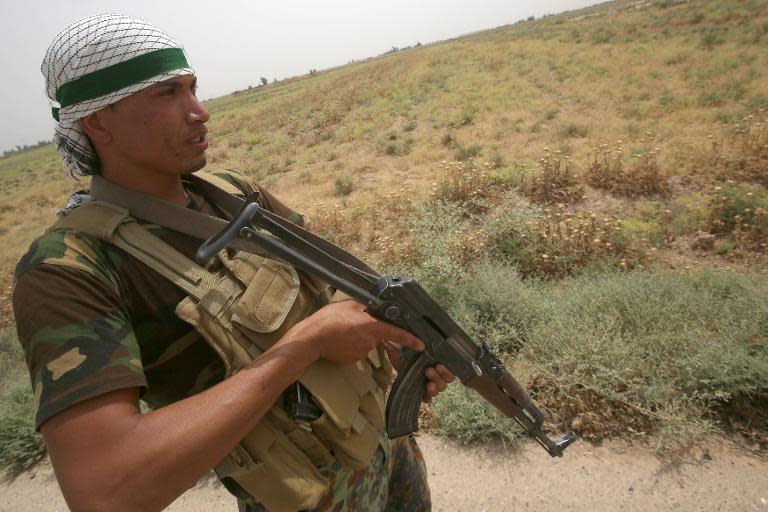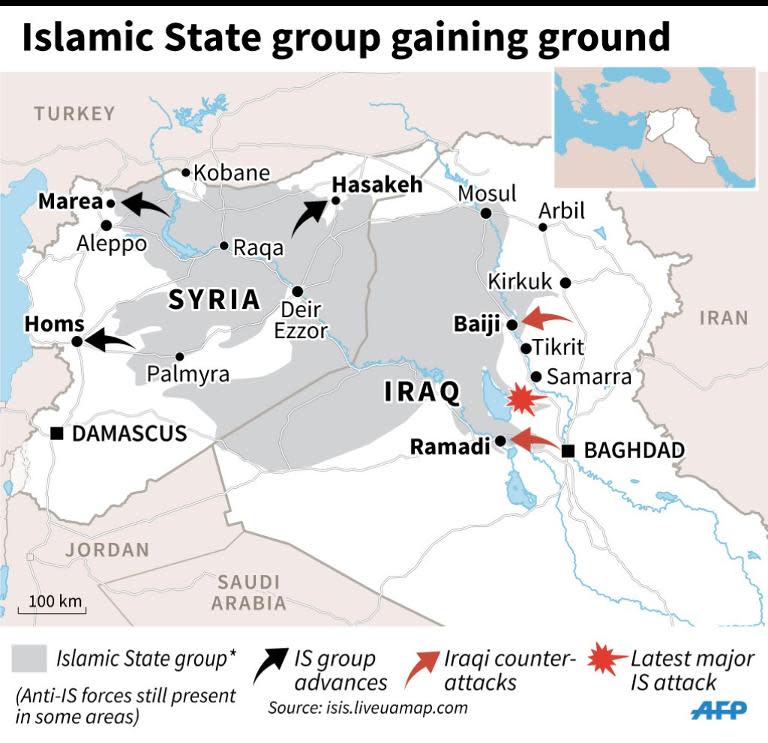Iraqi officials fear IS 'water war' in Ramadi
The Islamic State jihadist group will use its seizure of a dam in Ramadi to mount fresh attacks on pro-government forces preparing to besiege the city, Iraqi officials warned Wednesday. The day after the US-led coalition opposing IS met in Paris, General John Allen -- who is coordinating international efforts against the jihadists -- warned the fight to defeat them could last "a generation or more". A string of IS advances last month cast doubt on the coalition's strategy, but Washington has insisted it is on the right track. Prime Minister Haider al-Abadi said after the May 17 fall of Ramadi, the capital of Anbar province, that his men would take it back within days but operations are instead focusing on sealing off the city. IS militants used an unprecedented wave of suicide truck bomb attacks to seize Ramadi in a three-day blitz last month, and have again used this weapon in recent days. IS claimed responsibility Tuesday for a huge suicide attack that killed 47 people at a police base, which had been recently retaken as part of efforts to tighten the noose on Anbar. As they edge towards Ramadi, officials said Iraqi forces risked coming under attack because IS had closed the gates of a dam in the city to dry up the Euphrates. The move will enable IS fighters to cross or operate near the river more easily and to infiltrate more territory. - 'Water war' - "Daesh is now waging a filthy water war," said Sabah Karhout, the head of Anbar's provincial council, using an Arabic acronym for IS. "Cutting the water is the worst crime they could commit. It will force children, women and elderly people to flee and allow them to move in to launch attacks," he said. "Daesh may not have enough fighters to face us in a conventional battle right now," said Arkan Khalaf al-Tarmuz, another provincial council member. "So they are using water as a weapon to weaken areas where there are military bases," Tarmuz said. US Deputy Security of State Anthony Blinken told France Inter radio that 10,000 IS members had been killed since the start of a nine-month-old US-led air campaign in Iraq and Syria. IS fighters have repeatedly attempted to control dams in Iraq, in some cases reducing the flow of water to areas under government control or flooding swathes of land to impede military operations. "In the arid lands where the Islamic State fights, control of water is the ultimate weapon of terror," the Soufan Group intelligence consultancy said in a briefing note Wednesday. After Ramadi fell, Abadi had to call in the Hashed al-Shaabi (Popular Mobilisation) forces, an umbrella for mostly Shiite Iran-backed militias and volunteers. He and Washington had been reluctant to deploy them in Anbar, a Sunni bastion, for fear of stoking sectarian tensions. Speaking at a forum in Qatar, Allen admitted that it would be Shiite forces retaking ground from IS. "But then we have to secure the population and that should be done with Sunni police or Sunni tribes, and we're trying to invigorate both of those," he said. At a meeting in Paris that wrapped up on Tuesday, Western powers and other members of the 60-nation coalition vowed more support for Abadi's efforts. - 'Winning strategy' - Abadi had said that IS's regained momentum on the ground was a sign of the "failure" of the international community to provide adequate support. But Washington, which continues to refuse to send combat troops back to Iraq, and the coalition insisted they had a "winning strategy" of air strikes combined with thousands of forces training and advising Iraqi forces. "In Iraq right now we have the right strategy, a combination of air strikes, training and effective global partners," Blinken said at the meeting. On Syria, where a civil war has raged for more than four years and the humanitarian situation is even worse than in Iraq, Washington and its coalition partners said a solution would have to start with a political process. Syrian President Bashar al-Assad's "unwillingness" to fight IS made a UN-backed process for a more inclusive leadership the only way forward, a statement said. On Wednesday, Syrian regime aircraft dropped barrels bombs in the northern provinces of Aleppo and Idlib, killing at least 33 people including 10 children, the Syrian Observatory for Human Rights said. Assad has denied using barrel bombs -- crude weapons made of containers packed with explosives, known for causing indiscriminate damage -- but evidence collected by activists and rights groups includes footage of the barrels being pushed from army helicopters.

 Yahoo Finance
Yahoo Finance 



